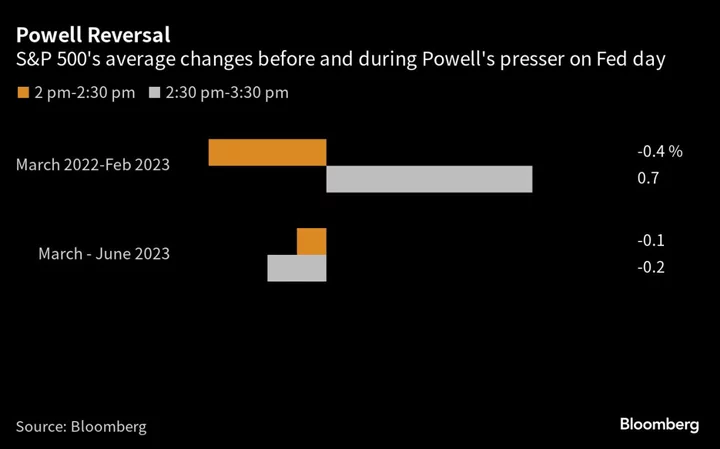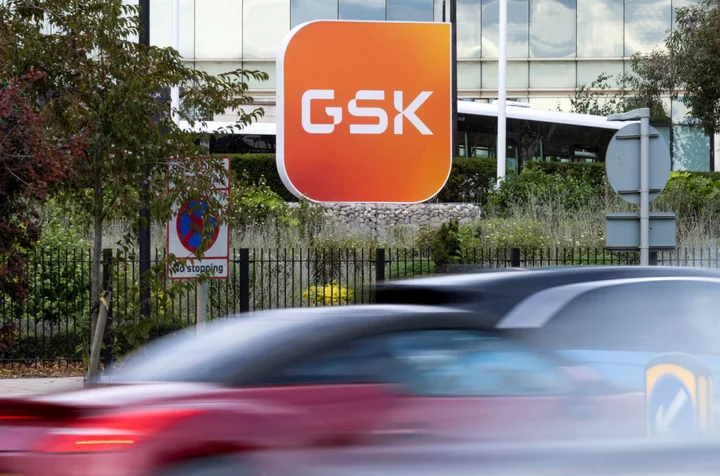
Bayern Munich seek new Daniel Levy meeting to thrash out Harry Kane deal
Bayern Munich want to meet with Tottenham chairman Daniel Levy again to discuss a deal for Harry Kane.
1970-01-01 08:00

Romeo Lavia: Southampton manager discusses midfielder's future following Liverpool bid
Southampton manager Russell Martin has given an update on Romeo Lavia after the midfielder was the subject of a bid from Liverpool.
1970-01-01 08:00

Snap Shares Drop After Sales Forecast Misses Estimates
Snap Inc. projected revenue at the lower end of analysts’ estimates for this quarter, signaling that improvements to
1970-01-01 08:00

Alphabet Shares Gain on Revenue Beat From Google Search
Google parent Alphabet Inc. reported second-quarter revenue that exceeded analysts’ expectations, boosted by advertising on the company’s flagship
1970-01-01 08:00

Powell Has Stopped Handing Gifts to Wall Street on Fed Day
In what was a brutal 2022 for investors, there was at least one sure-fire, money-making proposition for much
1970-01-01 08:00

Tesla Cars Barred From World University Games Ahead of Xi Visit
Tesla Inc. vehicles are barred from parts of a major Chinese city as it prepares for a visit
1970-01-01 08:00

Fire-Ravaged Greece Braces for More Heat as Rest of Europe Cools
Fire-ravaged Greece is the focus of Mediterranean heat, with temperatures set to climb back up to 47C (116.6F)
1970-01-01 08:00

Government has more work to do to ensure families secure quality childcare – MPs
The Government has more work to do to address “structural problems” in the early years system to ensure families benefit from high-quality affordable childcare under its reforms, MPs have said. Plans to expand the number of subsidised childcare places for working parents in England “should not come at the expense of quality”, the Commons Education Select Committee has warned. From September, the Government will change minimum staff-to-child ratios from 1:4 to 1:5 for two-year-olds in England, but it will remain optional. The group of MPs said it is “deeply concerned” about the plans and it is calling on the Government to reverse the changes “if quality is degraded”. Chancellor Jeremy Hunt announced reforms in the Budget in March which will allow some families of children as young as nine months in England to claim 30 hours of free childcare a week. Simply extending the number of hours that the Government calls free will not work unless the funding rates accurately reflect the costs of providing high quality early education and childcare Committee chairman Robin Walker From April next year, working parents of two-year-olds will be able to access 15 hours of free childcare. This will be extended to working parents of all children older than nine months from September next year. From September 2025, working parents of children under five will be entitled to 30 hours of free childcare per week. The Education Select Committee said it was a “welcome investment” following concerns raised by parents and early years providers during its inquiry about “affordability and sustainability”. The report added: “However, this investment is much overdue and more will need to be done to address the structural problems in the ECEC (Early Childhood Education Care) system if the funding increases are to be implemented effectively. “In particular, close attention should be paid to effective funding distribution. Settings in disadvantaged areas already struggle more than those in more affluent areas, yet we know that it is children from disadvantaged families that can benefit the most from high-quality ECEC.” The Treasury “missed an opportunity” to reform tax-free childcare and increase the flexibility of the system under its plans to expand free childcare for working parents, the report said. Under the current system, working parents of three and four-year-olds in England are eligible for 30 hours of free childcare per week. The tax-free childcare scheme also allows eligible working families to claim 20% government support with their childcare costs, up to an annual limit of £2,000 per child. The Commons Education Select Committee report said the requirement for parents to reconfirm their eligibility every three months for the 30 hours entitlement and tax-free childcare scheme is “unduly onerous” and should be reduced to once per year. Committee chairman Robin Walker said: “The childcare market is facing significant challenges in affordability and availability, with unprecedented staff turnover and nurseries closing, despite massive demand from parents who want a career and to provide for their families but struggle to find affordable services. It is clear that ministers have more work to do to address this. “Simply extending the number of hours that the Government calls free will not work unless the funding rates accurately reflect the costs of providing high-quality early education and childcare. “We have heard that many settings rely on charging more for the children who attend them outside of the funded hours. It is therefore essential that ministers reduce burdens on the sector and provide adequate funding for all the stages of early education.” He added: “Staff are the lifeblood of this sector and the huge expansion of subsidised childcare will only be successful if we can stem the tide of people leaving the workforce. “There needs to be a revamp of career development, with improvements to pay, progression and conditions so that the profession is given the respect and status it deserves.” Not only have years of severe underfunding plagued the sector but the worst staffing crisis in decades has created a perfect storm which must be addressed if the sector has any chance of survival in the coming years Neil Leitch, Early Years Alliance The cross-party group of MPs is calling on the Department for Education (DfE) to “work closely” with childcare providers and local authorities across the country “to set the funding rate at a sufficient level.” It added that the DfE should stop describing the 30 hours offer as ‘free hours’ and instead refer to it as ‘funded’ or ‘subsidised’ hours to “improve parental trust” in the childcare subsidy system. Neil Leitch, chief executive of the Early Years Alliance (EYA), said: “Not only have years of severe underfunding plagued the sector but the worst staffing crisis in decades has created a perfect storm which must be addressed if the sector has any chance of survival in the coming years. “If that wasn’t bad enough, it’s likely that the upcoming sector expansion will be dangerously underfunded and will place unrealistic expectations on providers already on the brink.” He added: “For the committee’s findings to truly have a lasting impact, we hope against hope that it finally wakes the Government up to the reality of the situation facing families and providers and prompts urgent and effective action.” Last week, the Government said reforms expanding the amount of free childcare for parents will be “properly and fairly funded”. The DfE said its proposed new funding formula, which is now out for consultation, provides “additional funding for areas of deprivation”. The increased funding will see the expected average rate paid to local authorities for 2024/25 to be set at £8.17 for two-year-olds and £11.06 for under-twos, the DfE said. A Government spokesperson said: “We are rolling out the single biggest investment in childcare in England ever, set to save a working parent using 30 hours of childcare up to an average of £6,500 per year and give children the best quality early years education. “To make sure that we are supporting our fantastic early years workforce, we will be investing hundreds of millions of pounds each year to increase the amounts we pay childcare providers. We also are consulting on how we distribute funding to make sure it is fair.” Read More Charity boss speaks out over ‘traumatic’ encounter with royal aide Ukraine war’s heaviest fight rages in east - follow live Wall squat exercises can help lower blood pressure, study suggests Wall sits and planks the best exercises for lowering blood pressure, study suggests Everything you need to know about using a defibrillator
1970-01-01 08:00

Wall squat exercises can help lower blood pressure, study suggests
Exercises such as “wall sits” could be the best form of activity to help people reduce blood pressure, a new study suggests. Other physical activity including cardio, resistance training and HIIT workouts are also good for bringing down resting blood pressure levels, researchers found. But isometric exercises – those that involve engaging muscles without movement, such as wall sits and planks – provide the best results, they said. The study, published in the British Journal of Sports Medicine, saw researchers conduct analysis on previous studies looking at exercise and blood pressure. These findings provide a comprehensive data driven framework to support the development of new exercise guideline recommendations for the prevention and treatment of arterial hypertension Researchers Some 270 studies were included in the final analysis which contained data on almost 16,000 people. They examined the impact different exercises had on systolic blood pressure, which notes the force at which the heart pumps blood around the body; and diastolic blood pressure, the resistance to the blood flow in the blood vessels between heartbeats when blood is pumped around the heart. The researchers, led by academics at Canterbury Christ Church University in Kent, found that there were significant reductions in resting blood pressure following cardio (aerobic exercise); dynamic resistance training, such as squats, press-ups and weights; high intensity interval training (HIIT); and combined training and HIIT. But the largest reductions were seen after isometric exercise training. A secondary analysis on specific types of exercises found the most benefit was seen among those who performed “isometric wall squats” and among runners. The academics said that current exercise recommendations for the prevention and treatment of high blood pressure are based on “older data” and suggest that it may be time to review the current guidelines. “Aerobic exercise training, dynamic resistance training, combined training, high-intensity interval training and isometric exercise training are all significantly effective in reducing resting systolic and diastolic blood pressure,” they wrote. “Overall, isometric exercise training is the most effective mode in reducing both systolic and diastolic blood pressure. “These findings provide a comprehensive data driven framework to support the development of new exercise guideline recommendations for the prevention and treatment of arterial hypertension.” For the average adult high blood pressure is considered to be from 140/90mmHg. When a person’s blood pressure is too high it puts extra strain on blood vessels, heart and other organs, such as the brain, kidneys and eyes. Persistent high blood pressure can lead to a number of serious health problems including heart attacks, strokes and vascular dementia. While there are medications which can help, people can make a number of life-style changes to help bring their blood pressure down including regular exercise, losing weight, cutting back on caffeine, alcohol and salt. Read More Charity boss speaks out over ‘traumatic’ encounter with royal aide Ukraine war’s heaviest fight rages in east - follow live Wall sits and planks the best exercises for lowering blood pressure, study suggests Everything you need to know about using a defibrillator What you need to know about the massive LVMH deal with the Paris Olympics
1970-01-01 08:00

Cambodia's Hun Sen resigns and hands power to son
The strongman ruler's move comes days after his ruling party consolidated power at an election.
1970-01-01 08:00

Fulham confirm signing of Raul Jimenez from Wolves
Raul Jimenez has completed his move to Fulham from Wolverhampton Wanderers.
1970-01-01 08:00

GSK Raises Outlook, Looks to New Medicines to Fuel Growth
GSK Plc raised its guidance for the year after a strong start to 2023 as it prepares to
1970-01-01 08:00
